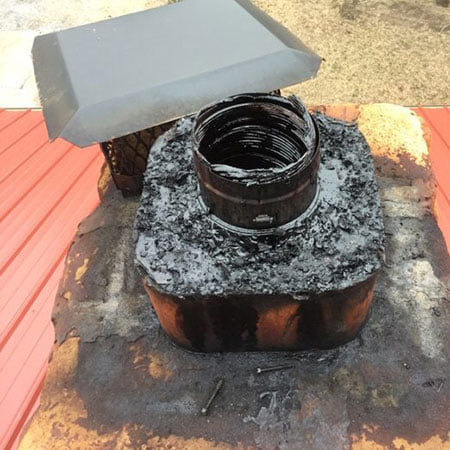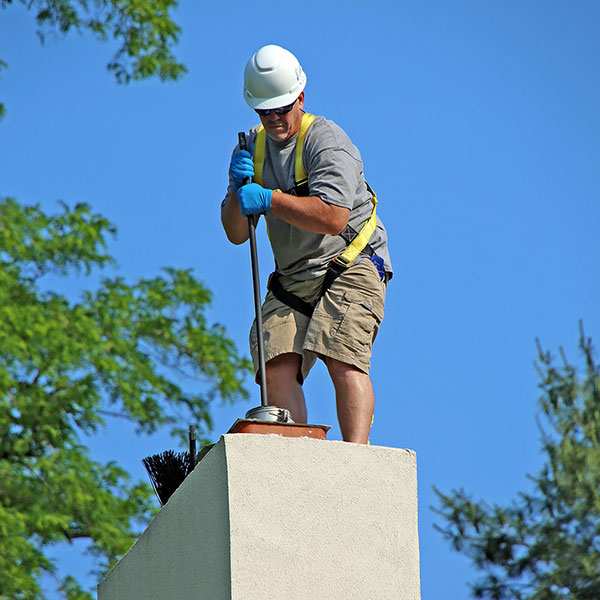Do I REALLY Need a Chimney Cleaning?
When it comes to chimney sweeping, many homeowners wonder if it is really necessary. Since there is no smoke or fire, everything must be working fine. Right? Not necessarily. Creosote build-up is the number one cause of house fires. It is also entirely preventable. Also, a chimney fire is not always noticeable. Many homeowners are unaware they had a chimney fire until a chimney sweep brought it to their attention during an annual chimney inspection or cleaning.
 Creosote – The Silent Fire Hazard
Creosote – The Silent Fire Hazard
Creosote is a byproduct of the combustion of wood and gas fuels. As smoke and exhaust vent out the chimney, some of the creosote sticks to the masonry and interior components. Each time the fireplace is lit, it accumulates more creosote residue. The longer creosote sits in the chimney, the more dangerous it becomes. Eventually, it turns into a dark, tarry, and crusty substance that is highly flammable and very difficult to remove. A hot ember flying around the flue can spark a fire. Creosote build-up causes over 25,000 house fires to occur annually, resulting in more than $100M in property damage. The Chimney Safety Institute of America (CSIA) considers 1/8″ or more of creosote to be a fire hazard and should be removed.
Do I still need a chimney cleaning if I don’t use the fireplace?
Many homeowners use their beautiful fireplaces for aesthetics instead of heat. Perhaps, you installed a central heating system and are no longer using the fireplace. That said, the chimney still needs an annual inspection. A chimney inspection is necessary to ensure the chimney system is structurally sound. Masonry damage like cracks and water damage can make the chimney unsafe even if you do not use the fireplace. If a chimney collapses, it could cause extensive structural damage to your house.
If you’re not using the fireplace, the chimney won’t need to be cleaned as frequently, but it will need to be cleaned from time to time. Dirt, grime, and mold may build up in the chimney, which can cause foul odors to emanate from the fireplace. It can also be hazardous to your health. Small animals such as birds and squirrels may take up residence in the chimney. They can also attract pests. When you have a chimney inspection, the chimney sweep will let you know if chimney cleaning is necessary.
What About Gas Fireplaces?
 Millions of homeowners are enjoying the convenience of a gas fireplace. Although gas is a clean-burning fuel, it is still necessary to inspect the fireplace and chimney every year by a certified technician to reduce the risk of fire and exposure to carbon monoxide. Also, gas fireplaces produce some creosote and soot, which will require chimney cleaning periodically. Leaves, twigs, and other debris can be blown in and will need to be removed to prevent a flue obstruction that can cause carbon monoxide exposure. The technician will inspect the gas line, valves, and fittings for any signs of wear or leaks. The ignition system will also be inspected and cleaned. The technician will conduct a complete visual inspection to assess the chimney’s condition and recommend any necessary repairs to ensure your gas fireplace is safe to operate.
Millions of homeowners are enjoying the convenience of a gas fireplace. Although gas is a clean-burning fuel, it is still necessary to inspect the fireplace and chimney every year by a certified technician to reduce the risk of fire and exposure to carbon monoxide. Also, gas fireplaces produce some creosote and soot, which will require chimney cleaning periodically. Leaves, twigs, and other debris can be blown in and will need to be removed to prevent a flue obstruction that can cause carbon monoxide exposure. The technician will inspect the gas line, valves, and fittings for any signs of wear or leaks. The ignition system will also be inspected and cleaned. The technician will conduct a complete visual inspection to assess the chimney’s condition and recommend any necessary repairs to ensure your gas fireplace is safe to operate.
The Bottom Line
Whether you have a wood-burning or gas fireplace, the National Fire Protection Association (NFPA) highly recommends annual chimney inspections and cleaning. Even if you are no longer using the fireplace, you should still schedule a yearly chimney inspection.


